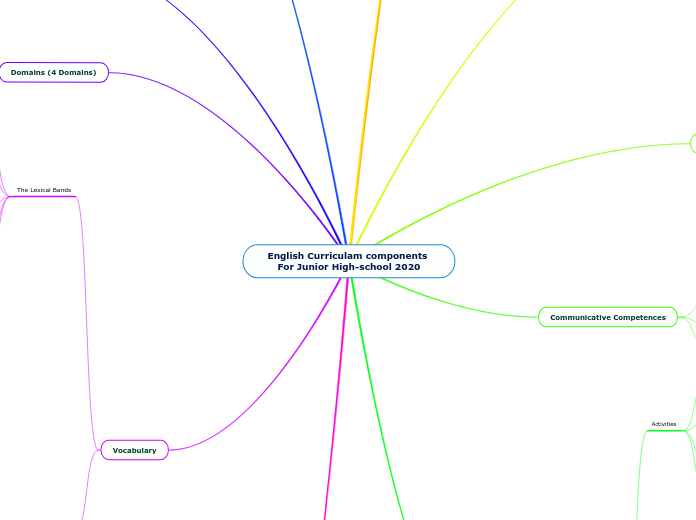English Curriculam components For Junior High-school 2020
Introduction
Alignment with the (CEFR)
The importance of adopting the CEFR.
6 Principles to Guide Teaching Practice
A. Principles underlying language learning and language teaching
Table 1
Language learning
Language Teaching
B. Principles underlying beginning language learning and teaching
Table 2
Beginning Language Learning
Beginning Language Teaching
C. Principles underlying the selection of materials
11 Material Features
D. Principles underlying the design of tasks
13 Tasks Features
E. Principles underlying classroom assessment
9 classroom assessment
F. Principles underlying the integration of ICT
9 principles of integrating ICT
Levels of Progression
English Curriculum 2020
1. Pre-basic User
2. Basic User I
3. Basic User II
4. Independent User I (4-point Bagrut)
5. Independent User II (5-point Bagrut)
CEFR Global Scale
1. Pre-A1
2. A1
3. A2
4. B1
5. B2
Revised English
Curriculum 2018
1. Pre-foundation
2. Foundation
3. Intermediate
4. Proficiency
Communicative Competences
Linguistic competence
Sociolinguistic competence
Pragmatics
Basic User II – A2 (Intermediate)
Activities
Reception
Spoken Reception
Written Reception
Production
Spoken production
Written production
Interaction
Spoken interaction
Written interaction
Mediation
Communicative competences
Linguistic
Phonological control
Orthographic control
Sociolinguistic
Pragmatic
Spoken fluency
Plurilingual and pluricultural competence
Grammar
Grammatical Structures for Grades 7, 8 and 9
Can-do descriptors
Clauses
Verb forms
Noun Forms
Adjective / adverb forms
Global Can-do Statements
Basic User II- A2 (Intermediate)
Reception
Spoken reception
Written reception
Production
Spoken production
Written production
Interaction
Spoken interaction
Written interaction
Mediation
Reception
Production
Interaction
Language Activities
Reception
Spoken Reception
Written Reception
Production
Spoken Production
Written Production
Interaction
Spoken Interaction
Written Interaction
Mediation
Reception
Production
Interaction
Can-do Statements
global can-do statements
operative can-do statements
Domains (4 Domains)
Educational domain
Occupational domain
Public domain
Personal domain
Vocabulary
The Lexical Bands
Pre-basic User (Pre-A1)
Pre Band I
Grade 3 and/or first months of
Grade 4.
Basic User I (A1)
Band I Core
Grade 4 – Mid-Grade 5.
Band I Core II
Mid-Grade 5 – End Grade 6.
Basic User II (A2)
Band II Core I
Grade 7 – Mid-Grade 8.
Band II Core II
Mid-Grade 8 – End Grade 9.
Independent User I (B1)
Band III (4 points)
Grade 10 – Grade 12.
Independent User II (B2)
Band III (5 points)
Grade 10 – Grade 12.
Vocabulary Targets For The Five Levels.
Pre-basic
User (Pre
A1)
Receptive
per level
200
Productive
per level
200
Cumulative
receptive
200
Cumulative
productive
200
Basic User I
(A1)
Receptive
per level
1200
Productive
per level
1000
Cumulative
receptive
1400
Cumulative
productive
1200
Basic User II
(A2)
Receptive
per level
2000
Productive
per level
800
Cumulative
receptive
3400
Cumulative
productive
2000
Independent
User I (B1)
Receptive
per level
900
Productive
per level
500
Cumulative
receptive
4300
Cumulative
productive
2500
Independent
User II (B2)
Receptive
per level
1100
Productive
per level
500
Cumulative
receptive
5400
Cumulative
productive
3000
Grammar
grammar component
Format of the grammar component
